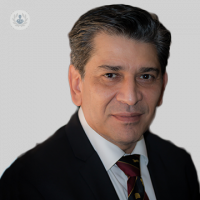What are the differences between thyroid and parathyroid surgery?
Written by:In his latest article, renowned consultant maxillofacial surgeon Mr Peyman Alam explains the difference between the thyroid and parathyroid glands, and how the surgery to treat them differs.

What is thyroid surgery?
Thyroid surgery is the removal of all or part of the thyroid gland.
What is the main difference between thyroid and parathyroid surgery?
The difference between thyroid and parathyroid needs to be understood to answer this question. These are both endocrine glands situated in the middle of the neck. The thyroid gland looks like a butterfly and is situated in front of the windpipe.
Behind the thyroid gland, there are four small glands called parathyroids. These are usually described as the size of a grain of rice. There is an upper-right, lower-right, upper-left and lower-left parathyroid gland.
The surgical approach is to make an incision at the bottom, front side of the neck in order to get to the thyroid. If it is thyroid surgery, only the thyroid is removed with the preservation of the parathyroid glands behind it.
For parathyroid surgery, the thyroid gland is mobilised and the diseased parathyroid gland is removed.
When are both surgeries required?
The two surgeries have different indications.
Thyroid surgery can be done to treat benign or malignant disease. It is sometimes done to confirm whether the nodule is cancerous or not.
Benign disease is usually a result of multi-nodular goitre (which can cause compressive symptoms), uncontrollable hyperthyroid (excessive thyroid secretion), or conditions like Graves' disease.
Sometimes the procedure is performed in order to confirm a diagnosis, after cytology shows something suspicious.
Finally, the main indication for thyroid surgery apart from benign disease is malignancy.
The main indication for parathyroid surgery is usually benign disease which causes enlargement of the gland, which affects calcium regulation in the blood.

What do both operations treat or cure?
Operations for thyroid surgery depend on the indications of the surgery. For example, surgery can be performed to treat overactive thyroid or compressive symptoms. If the surgery is performed for malignancy, then the surgery is done to remove cancer.
Parathyroid surgery is done to control calcium levels by controlling the parathyroid hormone levels. The removal of a diseased parathyroid can normalise the level of calcium in the blood.
How do recovery times for both compare?
This depends on the treatment. For example, if just half of the thyroid is removed, the recovery time is less than after a complete thyroidectomy. In general, about one to two weeks of recovery time is necessary. It is recommended to avoid heavy lifting or other intense activities for three or four weeks after the surgery.
Mr Peyman Alam is a leading consultant maxillofacial surgeon based in Chichester with over 20 years of experience. If you would like to book a consultation with Mr Alam you can do so today via his Top Doctors Profile.


